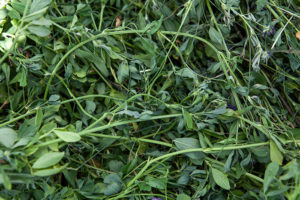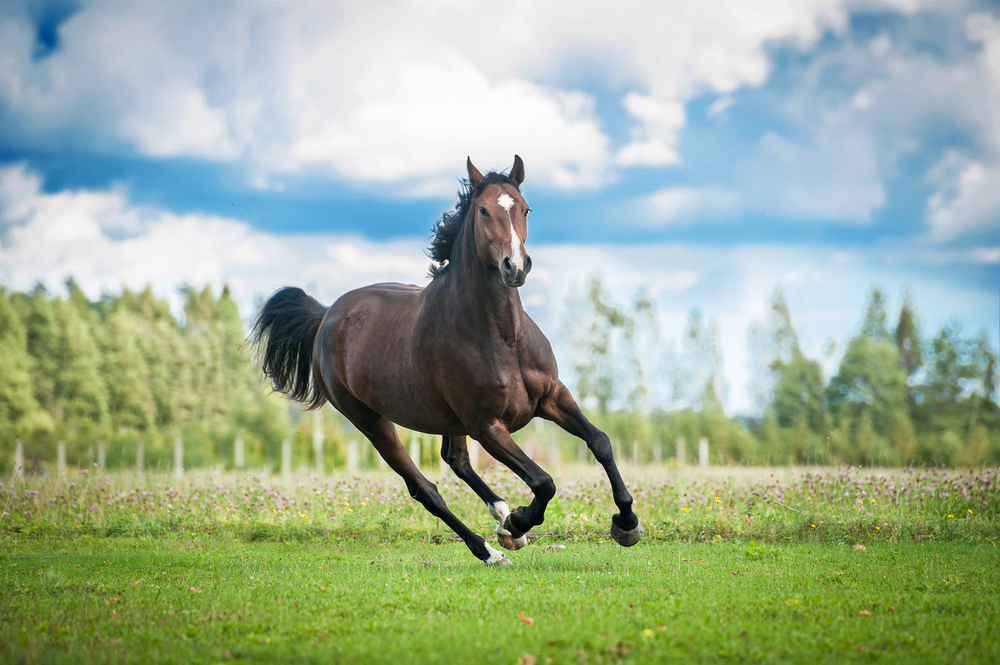
18 Feb 2021 7 Busted Horse Nutrition Myths
Horses and old wives’ tales go together like bread and butter, and it can be hard to distinguish fact from fiction. Misunderstandings about how to feed your horse are not common, but not due to horse owners not caring. Some outdated ideas stubbornly persist, despite being disproven by modern research.
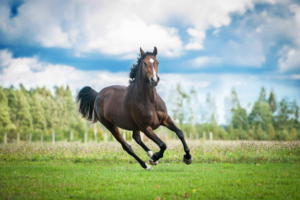
Here are 7 busted myths I want to share with you!
- Horses must be fed at the same time everyday
- Giving water to a hot horse will cause colic
- Feeding bran mash keeps your horse warm
- Alfalfa makes horses hot or excitable
- When you feed a horse “complete feed” there is no need for hay
- Grain after work causes colic
- A skinny horse means you need to feed more grain
Myth #1 – Horses must be fed at the same time everyday
Our horses may have helped spread this myth with the ruckus they kick up around feeding time. Horses who are used to being fed at a specific time each day will anticipate mealtimes and will become more vocal about receiving their meals “on time.” But these behaviors are only due to anticipating food. There is no biological reason to stick to a strict schedule for your horse. What is important is feeding small amounts regularly. Horses fed at regular intervals will not be harmed if they are fed their “grain” an hour earlier or later than usual, as long as they have access to forage in the form of either hay or grass.
However, it is best to mimic your horse’s natural feeding cycle to prevent colic and ulcers from forming. In general, allow your horse free choice hay or grass throughout the day so the production of saliva through chewing can act as the natural anti-acid it is designed to be.
Not only will your horse be more patient when feeding time comes, which helps prevent stall vices such as weaving, kicking the walls and other food aggression, but his digestive system will function better and the risk of coli will be drastically reduced.
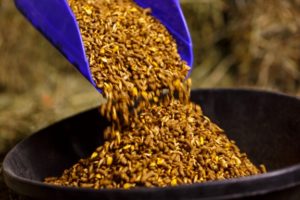
Myth #2 – Giving water to a hot horse will cause colic
This is simply not true. Hydration is vital for any horse, especially when working in hotter condition. In fact, withholding water can be dangerous, as it can lead to serious dehydration. Any horse should have access to water throughout the day. For a working horse, this is the quickest and best way to replace the hydration and an opportunity to add electrolytes lost in sweat. Waiting for a horse to cool down before allowing them to drink may worsen their dehydration. Learn more about caring for a horse in hot weather.
Keeping horses hydrated can also make them more comfortable by providing moisture in their airways, maintaining enough saliva to comfortably carry a bit in their mouth and flushing out lactic acid that builds up in muscles during exercise according to the experts.
No matter what, horses should have as much water as their bodies require.
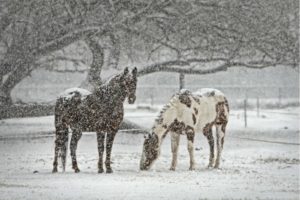
Myth #3 – Feeding bran mash keeps your horse warm
Although it may feel satisfying to prepare a warm mushy meal for your horse when the temperature drops, the feeling is mostly just yours.
In fact, making changes suddenly or on a day when horses may not be as inclined to drink anyway, could be a far worse choice than it seems. Sudden changes are not good for the digestive system, as the bacteria in the hindgut are susceptible to changes in the pH-levels brought on by such changes. Rice bran especially is detrimental because of its high phosphorus content and may cause severe mineral imbalances. It’s best to follow a consistent feeding program with no rapid changes.
If you’re worried about your horse not drinking enough, then soak their regular feed daily. Once your horse is used to eating soaked feed, you can increase the water ratio on hot or cold days without shocking your horse’s system.
If you’re worried about your horse feeling cold, the best way to keep your horse warm in the winter is to increase their fiber intake, or in other words, feed more hay – enough of it so they can eat continuously. (Don’t let it run out overnight.) Digesting fiber happens in the hindgut, and generates heat, which literally makes your horse feel warmer. At the same time you are improving the population of the bacteria in the hindgut in quality and numbers, which in turn helps with digestion and metabolism of food matter, making your horse feel warmer.
The secret to keeping horses happy in winter is providing continuous hay, not bran mashes.
Myth #4 – Alfalfa makes my horse hot
Although alfalfa, as a legume, contains more protein as well as calcium compared to grass hays, it is not so much protein that can cause mood swings in horses, it is mainly sugars and starches. Sugars and starches are highly soluble and therefore digested quickly, research shows. This can lead to equally rapidly changing levels of sugar in the blood, translating into inconsistent energy levels and thus inconsistent behavior. Food rich in fiber and fat however take a lot more time for the body to break down and therefore supply more steady and consistent energy. Alfalfa is low in sugar compared to other sources of forage and hay and therefore a more sustaining source of energy. It’s higher level of protein along with the presence of other minerals can help complete your horse’s diet.
It is true that a horse consuming a diet deficient of protein or based on low quality sources of protein, can act dull and subdued because their body needs to conserve energy. When you rebalance the deficiency, the horse will have more energy and will literally become more ‘alive’.
But the behavioral changes should not be linked to protein alone. That horse feels better because they are being fed better. They’ve gone from a deficient diet to a balanced one and feel like a new horse.
Carbohydrates, particularly starches and sugar, can affect a horse’s behavior, but most often there is a combination of environment, genetics and training which can contribute to how a horse behaves. And lastly, don’t underestimate your own influence on them.
Myth #5 – When you feed ‘complete feed’ there is no need for hay
First, we need to consider the definition of “complete feed“.
Sometimes manufacturers use this term for a grain which is fortified with vitamins and minerals, to make it ‘complete’. In that case, forage still needs to be fed alongside.
Sometimes the term describes a feed containing pelleted or chopped up hay as well as concentrates. These are typically created for senior horses that have dental issues and can’t chew well. But even in this case, it’s best to include some type of forage for your older horse, such as wet hay or soaked hay cubes.
It is important to remember horses need to chew in order to produce saliva, because saliva is the horse’s natural anti-acid to protect their stomach from developing ulcers. Every horse’s diet should be centered around forages like hay and grass, to insure there is enough chew time to work on the anti acid production and to satisfy their natural urge to graze.
In summary, looking at the feed labels to discover the actual ingredients may be more important than merely looking at the quantities and percentages of protein, fat and fiber, which is revealed in the ‘guaranteed analysis’. The ingredient list is what tells you exactly the source of the nutrition you’re putting into your horse’s body.
If you want to learn more about equine nutrition, here are some resources for you.
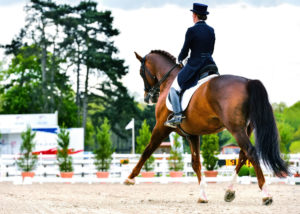
Myth #6 – Grain after a Work causes Colic
Colic is most simply defined as abdominal pain, and can be caused by many factors. Feeding can be one, but other variable are important not to forget.
A horse’s risk for colic increases with
- Large quantities of feed rich in starch
- Restricted movement due to limited or no turnout
- Poor quality hay or feed
- Limited water intake
- Various medicines or supplements
- Environment and management
While feeding grain may not be the only cause of colic after a workout, it’s better to allow some time between the two. Aim for 1 hour before or after a workout, including the time you spend grooming and tacking your horse. The amount of grain being fed in each feeding also matters in this calculation. A few smaller meals are better than a large meal all at once.
The amount of grain and the level of athletic performance are important when calculating when to let your horse eat after a workout. If you’re riding a performance horse that eats a lot of grain, you need to be careful with your timing. But if you’re taking your easy keeper that gets a handful of grain on a hack, you probably don’t need to worry about it at all.
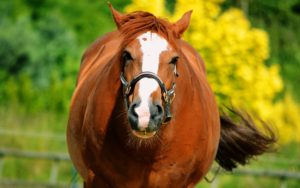
Myth #7 – A skinny horse means you need to feed more grain
Not necessarily. Weight issues such as being too skinny or too fat, are not always related just to diet or grain. A horse that’s too thin might have dental problems that makes chewing food difficult. Parasites can also make a horse struggle to put on weight or muscle. This is especially true if the horse seems “belly fat” with a skinny topline. Evaluate your horse’s body condition score and worming schedule.
Similarly, the solution to an obese horse isn’t simply to restrict food, it is about managing the quantity, quality and speed of intake. Restricting food may result in depriving them of essential nutrients, which can make them lethargic, moody, or potentially lead to more serious health issues.
Oftentimes, the horses that “get fat on air” need a combined feeding and exercising program that gives them the macro and micro nutrients they need. The quantity of food intake along with what kind of food combined with an exercise plan will need to be designed in order to stay healthy.
The best choice to make when a horse has trouble maintaining an ideal weight is a complete diet analysis, perhaps partnered with a veterinary exam to rule out dental issues or to identify metabolic abnormalities or the presence of parasites.
If your horse gets too fat or too thin, don’t just assume that the answer is as simple as adding or subtracting grain. Talk to one of our experts before you make any changes.
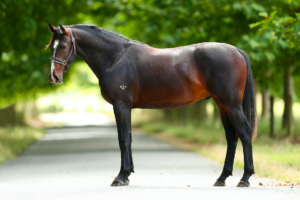
Summary
There are many myths around horses and nutrition, so make sure to question your assumptions. And when in doubt, reach out for help to someone with certified nutritional knowledge. If you want some guidance, we’re here to help! Get a FREE diet consultation now and let us help your horse to live a healthier, more balanced life!
